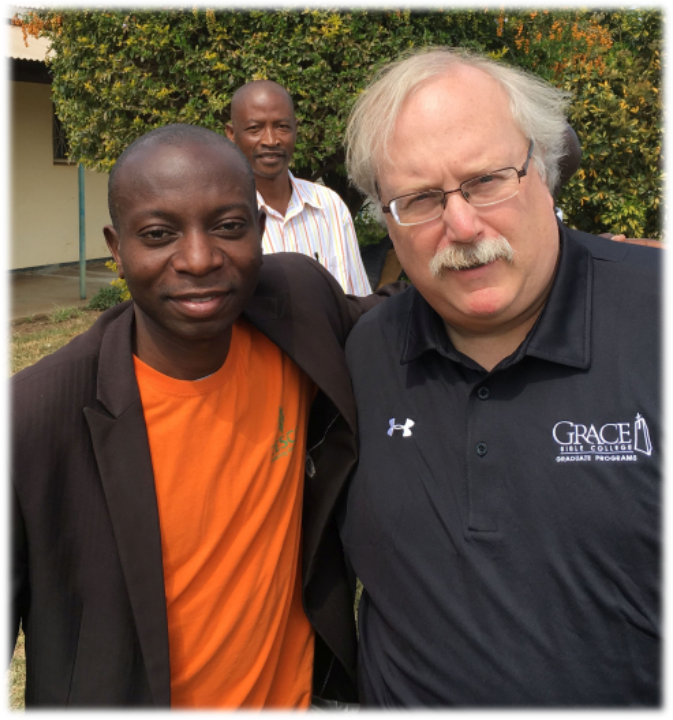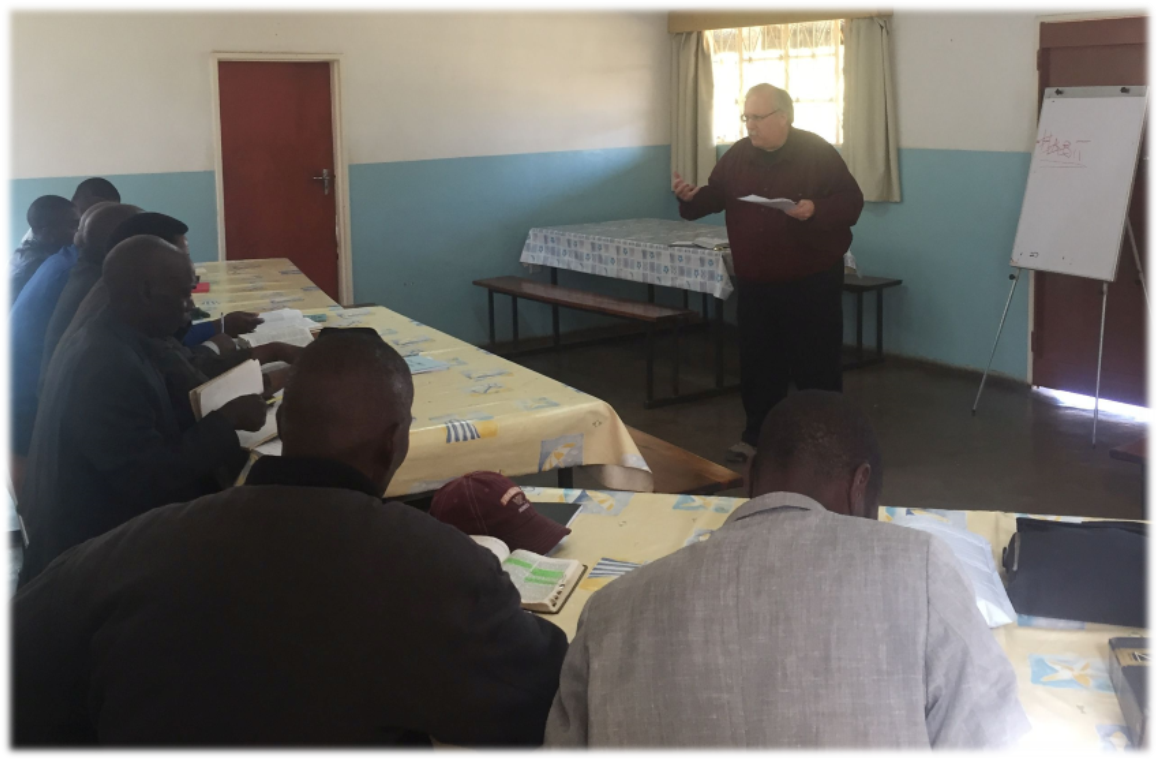[column width=”1/1″ last=”true” title=”” title_type=”single” animation=”none” implicit=”true”]
July 3-7, 2017
Jim Moore came to my office almost a year ago and asked if I would be interested in traveling to Zambia to do pastoral training. He had just returned from a very positive meeting with the Zambia church leadership where Grace Church Zambia clarified their vision and goals and created a list of ministry priorities and needs. One of the major needs was for pastoral training. Many pastors and elders do not have the opportunity to receive any formal Bible College training and I immediately said yes, and Jim began the process of planning one of the largest church conferences in Grace Church Zambia history. What made this conference unique is the participation of the leadership of the Zambian church. Not only did the national church leadership do most of the planning, but they also provided some financial support for housing, food and travel for many of the participants.
Visiting Ministries around Kabwe
After visiting Livingstone and Victoria Falls, we spent the day before the conference visiting several ministries around Kabwe. We visited the Zambian Grace Church offices for an orientation to the conference led by the chairman of the Zambian Grace church, Chrispin Mundia and Eric Mango, currently serving as a missionary in
 Malawi. We also toured the grounds of the Zambian Grace Bible Institute. Sadly this large plot is not being used to its full potential as a training center, although there is a school and larger church on the grounds.
Malawi. We also toured the grounds of the Zambian Grace Bible Institute. Sadly this large plot is not being used to its full potential as a training center, although there is a school and larger church on the grounds.
In the afternoon we visited the “Deaf Farm.” This ministry is led by Roy and Sarah Mwanza for the last several years. Roy drove half the group in his truck and we followed in a less manly SUV down a very rutted dirt road, through several small collections of houses which were certainly “off the grid.” There was one point were we needed to get out of our vehicle so it could make it over a set of railroad tracks. Roy and Sarah host about sixteen children in a small house with another sixteen who are away at school right now. Roy has some cattle, pigs, many chickens and rabbits, and even a few pigeons (for fertilizer and food). They have a wide range of vegetables and fruit trees as well. The main house has solar panels and two wells (one for drinking and another for irrigation).
Even though Roy and Sarah have provided wonderfully for the children, there is a great deal of need. The solar panels do not provide sufficient power, so they could use a few more as well as a new converter to charge the batteries. He has a good pump for his drinking water, but the irrigation pump needs to be replaced. The ministry is supported by some local ministries and some gifts from American churches (Grace Ministries International, for example), but Roy and Sarah have more needs. Roy’s truck is very old and in need of repair, or better, replacement. He needs to navigate the dirt road every day to get the kids to school, and he relies on it every day.
The Sunday before the conference we attended services at Grace Centre. Cliff Tulsie preached on Luke 8. After the service we traveled to the Grace Church in Kamushanga. This was a combined service with more than 350 people from nine Zambian churches and representatives from both Malawi and Zimbabwe. The service had been going for a while when we arrived at 10 AM and we were warmly greeted with singing and dancing. Lots of singing and dancing. As the “special guests” we were ushered to our guest seats (this was a very unusual experience for me, although I think I could get used to it).
After several sets of announcements and a long time of introductions and offering, Jim Moore presented a short report on last year’s leadership conference. The result of that meeting was a clear vision statement for the Zambian church as well as eight priorities for ministry in Zambia. This was a very important presentation which seemed to be well accepted by the members present.
result of that meeting was a clear vision statement for the Zambian church as well as eight priorities for ministry in Zambia. This was a very important presentation which seemed to be well accepted by the members present.
Robert Nix preached on Philippians 1:20-21, “to live is Christ, to die is gain.” I followed Robert and preached through Ephesians 2:8-10. We used Chrispin as an interpreter, although many of the Zambians understand English. If you have ever preached with an interpreter, it is quite the experience. Sometimes I would say a short sentence and Chrispin would translate with far more words than I expected, sometimes with a short phrase. I assume he was correcting something I said which was culturally horrifying. I also learned my humor does not translate very well.
After the five hour service we were invited to Pastor Winter’s house for a traditional Zambian meal. And a Zambian meal includes nshima. This looks like a lump of mashed potatoes, but is actually white cornmeal and water. You are supposed to pull a chunk out and roll it into a ball, then mix it with whatever else is served with it, called “relishes.” There was a dish of cabbage, something that looked like spinach, and a bowl of caterpillars (I was warned and so avoided the experience, Joel thought they were pieces of beef). I will admit I did not fully indulge in the culture and used a fork to eat my nshima, but others enjoyed theirs Zambian style.
The Conference
Grace Church Zambia rented rooms at a Catholic school for the meetings and housing for those who traveled to the conference. There are seventy pastors, elders and church leaders from Zambia, Malawi, Zimbabwe, and Congo. Each morning began with worship led by Eric Mango and a devotional from one of the African leaders (Joseph Asong, Kennedy Simtowe). The conference offered four parallel sessions each day with a lunch break. The five teachers ran sixty-two workshops over the five days. Everyone taught through their material twice, so that the leaders could choose multiple topics. There were twelve sessions on Ephesians which did not repeat.
In my sessions I taught through the book of Ephesians. This allowed me to teach on both doctrine and practice following the flow of the book. I especially enjoyed several stimulating discussions on Paul’s description of spiritual darkness in Ephesians. The pastors and elders had many questions on how to deal with serious false teaching in their communities and often made a connection between spiritual warfare and some local evangelists who were preaching a “health and wealth” gospel.
I was personally quite pleased with the level of thoughtful reflection on the text of Ephesians from the group. I am certainly being taught as much as I am teaching. My group had a very stimulating discussion in my session on Ephesians 3 on the meaning of prophecy. In my second session that day there was a great deal of interest in “one baptism” in Ephesians 4. Certainly the pastors helped me to understand many of the unique issues pastors face in Zambia.
[/column]

